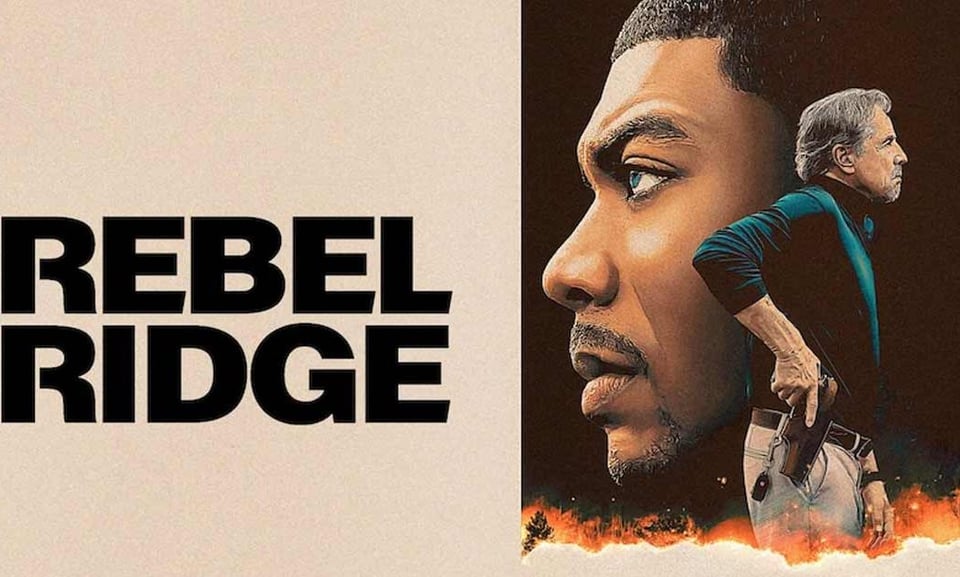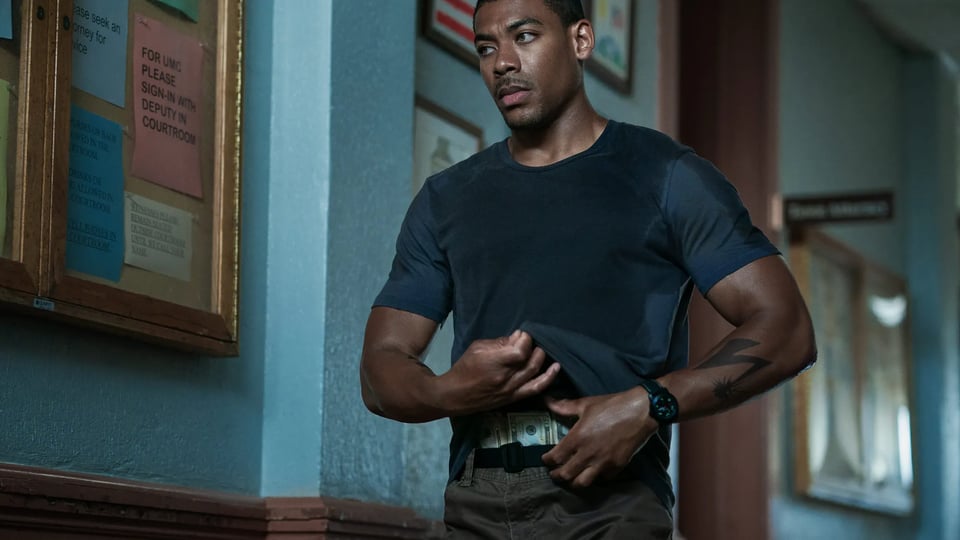Rebel Ridge: Civil Asset Forfeiture and Policing for Profit

Happy Wednesday,
This week’s newsletter is arriving later than usual because Hope and I returned late Sunday from a weekend trip to Doha. Because we moved to Abu Dhabi during the GCC’s Period of Troubles, which started in 2017 and ended in 2021, it was our first time visiting Qatar. It’s an interesting place. It feels planned and precision built by computer and has streets wide enough to park a 737. We enjoyed our time and it’s likely we’ll return in the near future.
This also feels like a good time to remind you that we co-author a travelogue called Bowlings Abroad that I selfishly think is worth checking out.
On to the main event.
Rebel Ridge is the latest film from writer and director Jeremy Saulnier. His previous works include his 2014, “I'm not built for a life of crime, but I'm gonna to try it anyway” debut, Blue Ruin and the “earnest punk band trying to escape drug dealing murderous Oregon Nazis” thriller, Green Room. The action in his films, especially the titular scene in Green Room, is notably visceral. It’s kinda his trademark. Rebel Ridge was released on September 6, but for the usual complications of life, I finally got around to watching it this week.

British actor Aaron Pierre plays the lead in the Netflix original, an ex-Marine named Terry Richmond. I don’t know his prior films and honestly didn’t know he was a Brit until I Googled him after watching the film. He apparently has an excellent accent/dialect coach because in real life he sounds like he’s ripped from a British cop drama, like Line of Duty. About ten minutes ago, I saw an article suggesting him as the next Bond. I’m intrigued by the prospect and certainly the They Stay Mad Bros on the internet would have a full meltdown.
In the pre-release hype for the film, I saw it described as a “Black Rambo” but this description is deceiving. When most of us think about Rambo, we think about the sequels, which are all terrible and mostly about imaginary left-behind POWs in SE Asia. However the original Rambo film, First Blood (which I honestly hadn't watched until a few years ago), is about a Vietnam War veteran fighting corrupt police in the fictional town of Hope, Washington. In the film, the cops target Rambo unjustly, assaulting and falsely imprisoning him, pushing him to the brink, and the film ends with a pretty damn impressive-for-1982 action sequence in the woods.
That's more or less the story of Rebel Ridge but in my opinion this film has a bit of a cop out ending, no pun intended. I can’t explain it without spoiling the ending but there is a little too much “let bygones be bygones” in the finale for me.
The plot of Rebel Ridge centers on the law enforcement practice of civil asset forfeiture, an absolutely bananas legal maneuver where cops is able to seize the property of people accused of crimes and expropriate it with little due process.
It's one of those practices that the party of small government in America should decry but they don't. In fact, they’re among its loudest advocates.
Journalist Radley Balko is the only consistent (and decent) libertarian in the US public sphere. He’s a vocal critic of the war on drugs, mass incarceration, and wrote the seminal book on US police militarization, Rise of the Warrior Cop. The book explores how the militarization of US police has eroded civil liberties, transformed law enforcement for the worse, and heightened the use of excessive force—all at the expense of public trust.
Balko has sounded alarms about civil asset forfeiture for at least three presidencies.
Here he is in 2010, writing in Slate, about civil asset forfeiture and the steps demonstrably innocent people need to go through to get their property once it's seized by law enforcement:
Civil asset forfeiture, an outgrowth of the drug war, rests on the legal theory that property can be guilty of a crime. Once authorities establish a nexus between a piece of property and criminal activity—most commonly drug cases, but also prostitution, DWI, and white collar crime—the owner must prove his innocence or lose his property, even if he’s never charged with an underlying crime. In most jurisdictions, seized cash and the proceeds from the auctioned property go back to the police departments and prosecutors’ offices responsible for the seizure. The scheme, which creates unsavory incentives for public officials, became popular because of a 1984 federal bill designed to encourage aggressive enforcement.
Like every ill in US society, the impacts of civil asset forfeiture fall disproportionately on communities of color, low-income families, and especially locales where those two Venn Diagrams overlap.
Between 2000 and 2019, the federal government and states are estimated to have pocketed a combined total of $68.8 billion through forfeiture, according to the Policing for Profit Report. They note that reporting from states is inconsistent (often intentionally), meaning the number is likely much, much higher.
Police departments and municipalities have used proceeds from civil asset forfeiture to fund a wide range of activities, often without much oversight. These funds have been directed toward buying military-grade equipment, vehicles, and weaponry, as well as financing general police operations. Some departments have used the money for office upgrades, lavish travel, and even to bolster slush funds, rather than for community-based safety programs. The lack of transparency and accountability in how these assets are utilized has fueled concerns about abuse and incentivized aggressive policing strategies.
It's the kind of abuse we expect from authoritarian regimes and that would be banned in a society that values individual liberty and due process as much as the US claims. But rather than being banned the practice is expanding.
The heart of Rebel Ridge—and the real-world practice it critiques—leaves you with the same lingering discomfort. The absurdity of civil asset forfeiture is so egregious that it feels almost fictional. Yet, like the characters in Rebel Ridge, real people find themselves caught in a system designed not for justice, but for profit.
It's a harsh, unsettling reality—and one that desperately needs a reckoning.
–
Speaking of police and reckoning, I want to put on your radar that the Chief of Police in Tacoma, Washington, has been placed on administrative leave for nearly a week and no one in either the department or in city government will explain why to the public. This is unacceptable, particularly in a city with a very uneven record of law enforcement oversight, and a recent-ish history of misconduct by department leadership. It’s a story worth following.
Until Sunday.